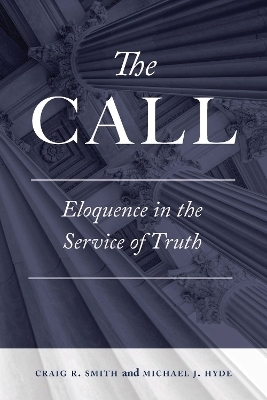
The Call
Eloquence in the Service of Truth
Seiten
2022
Michigan State University Press (Verlag)
978-1-61186-409-0 (ISBN)
Michigan State University Press (Verlag)
978-1-61186-409-0 (ISBN)
Offers an examination of the phenomenon of the call. Characterizing the call as a rhetorical event, the book identifies how speakers can use eloquence in the service of truth. The authors offer the rare combination of a phenomenology of the call linked closely to eloquence and explore this linkage by examining the components of eloquence.
This book is a unique examination of the phenomenon of the call. Characterizing the call as a rhetorical event, the book identifies how speakers can use eloquence in the service of truth. Authors Craig R. Smith and Michael J. Hyde offer the rare combination of a phenomenology of the call linked closely to eloquence and explore this linkage by examining the components of eloquence, including examples of its misuse by George W. Bush and Donald Trump. The bulk of the text examines case studies of eloquence in the service of truth including epideictic, forensic, and deliberative eloquence, with examples drawn from addresses by Barack Obama, Daniel Webster, Ronald Reagan, Margaret Chase Smith, Susan Collins, and Mitt Romney. The authors also examine the Epistles of St. Paul, the writings of St. Augustine, and the preaching of Jonathan Edwards. Finally, the book explores eloquence in filmic narratives and dialogic communication between artists and writers, concluding with a study of the sublime and how it is evoked with awe using the work of Annie Dillard.
This book is a unique examination of the phenomenon of the call. Characterizing the call as a rhetorical event, the book identifies how speakers can use eloquence in the service of truth. Authors Craig R. Smith and Michael J. Hyde offer the rare combination of a phenomenology of the call linked closely to eloquence and explore this linkage by examining the components of eloquence, including examples of its misuse by George W. Bush and Donald Trump. The bulk of the text examines case studies of eloquence in the service of truth including epideictic, forensic, and deliberative eloquence, with examples drawn from addresses by Barack Obama, Daniel Webster, Ronald Reagan, Margaret Chase Smith, Susan Collins, and Mitt Romney. The authors also examine the Epistles of St. Paul, the writings of St. Augustine, and the preaching of Jonathan Edwards. Finally, the book explores eloquence in filmic narratives and dialogic communication between artists and writers, concluding with a study of the sublime and how it is evoked with awe using the work of Annie Dillard.
Craig R. Smith is the director emeritus of the Center for First Amendment Studies at California State University, Long Beach, where he taught for twenty-seven years. In 2010 he received the Douglas W. Ehninger Distinguished Rhetorical Scholar Award from the National Communication Association for his contributions to rhetorical theory. Michael J. Hyde is professor and University Distinguished Chair in Communication Ethics at Wake Forest University. He is a distinguished scholar of the National Communication Association, a fellow of the W. K. Kellogg Foundation, and a recipient of national, state, and university research grants for his work in “the rhetoric of medicine.”
| Erscheinungsdatum | 31.01.2022 |
|---|---|
| Verlagsort | East Lansing, MI |
| Sprache | englisch |
| Maße | 152 x 229 mm |
| Gewicht | 333 g |
| Themenwelt | Geisteswissenschaften ► Philosophie |
| Geisteswissenschaften ► Sprach- / Literaturwissenschaft ► Sprachwissenschaft | |
| Sozialwissenschaften ► Kommunikation / Medien ► Kommunikationswissenschaft | |
| ISBN-10 | 1-61186-409-7 / 1611864097 |
| ISBN-13 | 978-1-61186-409-0 / 9781611864090 |
| Zustand | Neuware |
| Informationen gemäß Produktsicherheitsverordnung (GPSR) | |
| Haben Sie eine Frage zum Produkt? |
Mehr entdecken
aus dem Bereich
aus dem Bereich
Das umfassende Standardwerk auf der Grundlage der aktuellen amtlichen …
Buch | Hardcover (2024)
Duden (Cornelsen Verlag)
35,00 €
und wie man sie vermeidet
Buch | Softcover (2022)
C.H.Beck (Verlag)
14,00 €


